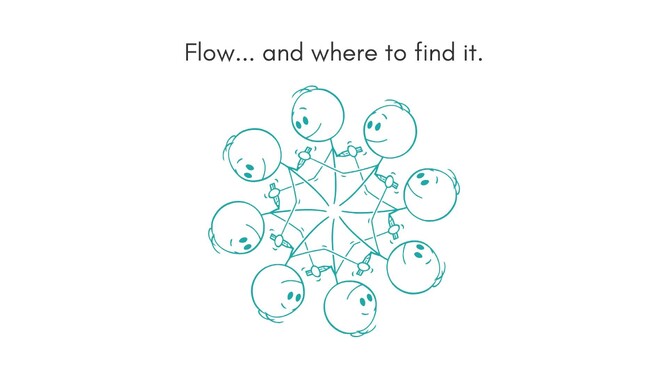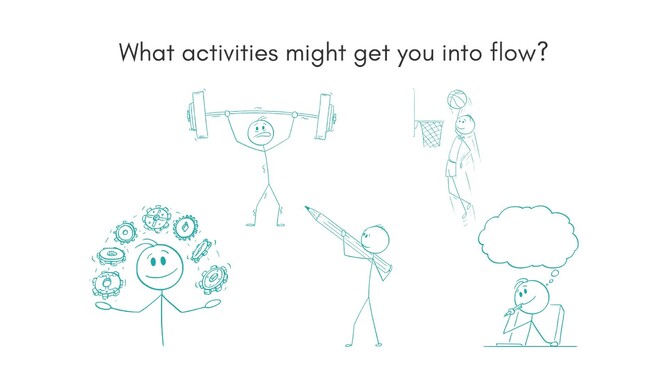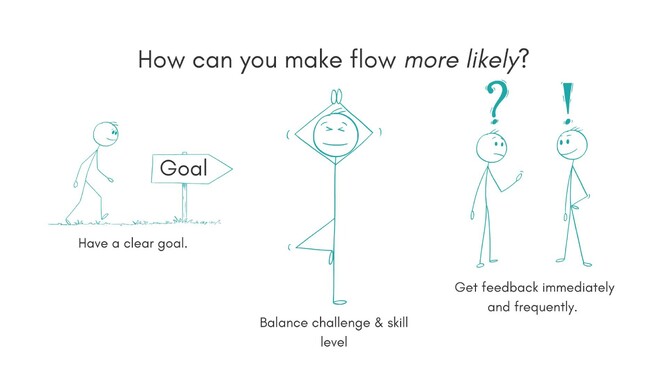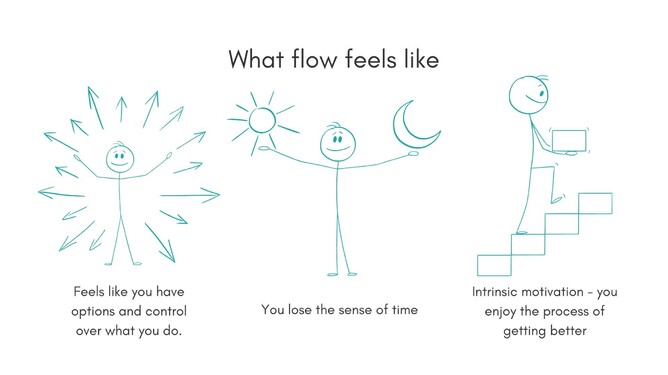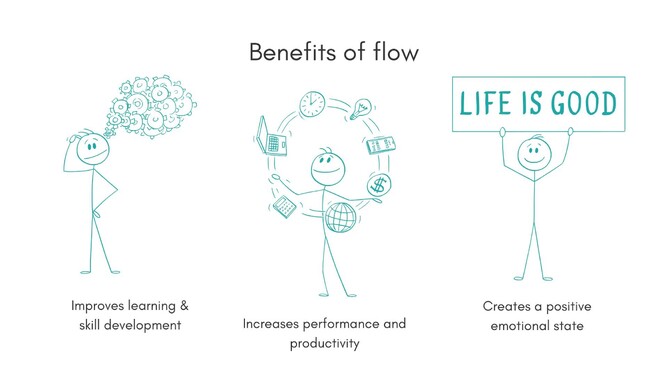Do you find yourself fully immersed in something from time to time? Have you ever been so into an activity that time seems to become irrelevant? You look up after what feels like five minutes, and three hours have passed? That experience, being fully immersed in something and being fully focused, is called Flow.
You have probably heard about it. It is an incredibly productive state, and one that people seek to achieve. That’s not always easy, but if you know the conditions that help us reach flow, you might be able to create those or influence your day, environment, and tasks in ways that make flow more likely.
Mihaly Csikszentmihalyi was a Hungarian-American psychologist who paid close attention to human creativity and focus and explored the phenomenon of Flow. If you haven’t read his book titled ‘Flow’ yet, I would recommend it. For a brief overview, you can read this blog. :)
We commonly associate flow with athletes or artists, people who express themselves creatively and physically. However, it is not limited to them. You can reach flow state while solving math problems, playing games, writing code, teaching or facilitating workshops, building, gardening, treating someone, cleaning, doing admin, and so much more.
So, somewhere in your life, there is an opportunity for flow.
Before we dive into the conditions that make flow more likely, briefly think about when you last felt flow. What were you doing? Where were you? It’s useful to have a personal example in mind.
Ok, so Mihaly Csikszentmihalyi identified the elements that make the occurrence of flow more likely. They are not a guarantee, but they increase the likelihood. Here they are:
Clear goals
Having clarity on what you are trying to do or achieve at every step of the way is really helpful not only to achieve the goals themselves, but also to experience flow in the process of pursuing them.
Challenge-skill balance
The task must not be too easy or too hard. You must be able to do it, with some difficulty, but not too much. That way, the task requires your full focus, because you are only able to complete it if you apply yourself and your skills fully.
Immediate and honest feedback
Feedback helps you get and stay on track. The feedback needs to be specific to the task and to what you can do to improve next time.
Experience during Flow:
Deep focus or concentration
To achieve flow, distractions need to be minimal or non-existent. (Just as I was writing this very point, I picked up my phone to ‘check’ (who knows what… so, clearly I was not in a flow state while writing this blog; however, often I am in flow while writing. It is one of the reasons I like doing it.)
A sense of control
To reach flow, you must feel like you have a degree of control over what you are doing. It is much less likely that you will achieve flow if you are forced to do something. It is easier if you feel like you are in charge and control of your actions and with that your outcome.
Consequences of Flow
A different sense of time
When you reach flow, time might slow down or speed up; often, it becomes irrelevant.
Loss of self-consciousness
We often worry about how we come across or what others might think of us. When we reach flow, this becomes irrelevant. We are so immersed and engaged in the task that we lose our awareness of ourselves, and with that worry about what others may or may not make of it to you.
Intrinsic motivation
I have written elsewhere about different kinds of motivation, but when you reach flow, your motivation is likely intrinsic. You are working on the task for your own sake and simply to do and enjoy it today. You are not motivated by external rewards like money or recognition. The motivation comes from doing this task well.
Unsurprisingly, there are some real benefits to flow:
Better focus - you are fully engaged and present in the moment while completing this task
Better performance - many athletes and musicians aim for flow to reach peak performance. The same is true for performance and work, and in academia, we just talk about it less in those contexts.
Increased productivity - unsurprisingly, better focus and better performance lead to increased productivity; tasks are completed more quickly and to a higher quality.
Greater enjoyment - people enjoy being in a flow state, and they experience satisfaction with their work during as well as afterwards.
Improved learning and skill development - Flow helps on the way to mastery. It enhances the rate of learning, which means it is easier to get better faster.
Increased creativity - flow state enables creative problem-solving and out-of-the-box thinking.
Flow encourages a positive emotional state - being present and focused in the moment lowers stress and anxiety, which, in turn, enables a more positive emotional state.
Looking at all those elements that help generate flow, it becomes clear why athletes chase it and find themselves in flow regularly:
They usually have at least one clear goal.
They usually have tight feedback loops. Their performance gives them immediate feedback (you know immediately if you are not jumping far enough, or running fast enough…), their coaches and teammates offer feedback, and they might get some data or video to reflect further.
The challenge-skills balance is usually about right for them. They are already proficient at the skill, but are looking to refine, add a new element, expand their repertoire, etc.
During training, distractions are often minimised. Many athletes leave their phones in their bags or the changing rooms. Most times, the training environment is so familiar that it does not create much distraction. (This is also why athletes specifically prepare for major competitions, which will have spectators or different conditions, such as sharing spaces with other nations or a different climate.)
Athletes often have some control over what they are doing and what they are practising, or at the very least, they have an opportunity to discuss what they would like to do with their coaches.
Etc.
It’s your turn now: What are the activities that have gotten you into flow state in the past? And, if you haven’t experienced flow in a little while, why do you think that is?
Think about an activity or task you would like to experience flow with. Consider the conditions that make it more likely for flow to occur and check if you can create those conditions for yourself.
What is your goal with this activity?
Who can give you feedback?
How can you minimise distractions?
What about this activity do you control?
What is your challenge/skill balance with this task? Would it be helpful to learn a little more? Where could you do that? Who could help?
Etc.
See if you can generate little pockets of flow for yourself.
If you have found this useful, please let me know. I would love to hear from you. If you know someone else who might find this helpful, please share it with them.
Until next time
T
Key points:
Flow creates better focus and performance, which increases our overall productivity and gives a greater sense of achievement.
Flow supports our learning and skill development and increases creativity. Working in flow is also more enjoyable and contributes to a positive emotional state.
While we can’t force flow, we can aim to create the conditions that make flow more likely to occur.
Reflective questions:
What are the key activities during which you have experienced flow?
What gets in the way when you are aiming to get into flow but can’t seem to quite cross the line into that space?
Get specific:
What goal have you set that you might achieve with the help of a bit of time spent in flow?
What are the key distractions for you that you would need to minimise?
What skills might you want to further develop to make flow more likely? And what additional challenge might you want to set yourself (remember, flow is not likely to occur if the task is too easy)?
References:
If you would like to learn more about flow, start here:
Csikszentmihalyi, M. (1990). Flow: the psychology of optimal experience. Harper & Row.
